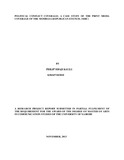| dc.description.abstract | This study sought to analyses the print media coverage of the Mombasa Republican Council in
the period ahead of the March 4, 2013 General Elections. It was an assessment of the
effectiveness of the execution of the watchdog role by the print media in reporting about the
MRC who were regarded as articulators of Coast people’s grievances. The purpose of the study
was to investigate the contribution of print media articles in the anxiety and tension experienced
especially among the up-country people who had settled in the region. The objectives included:
determining if the print media coverage on MRC issues was causing anxiety; establishing if
failure to highlight Coastals’ problems was leading to the secession call; assess the possibility of
having print media focus on historical injustices at the Coast; and determining the impact of print
media reports on the MRC issue.
The initial target population was 20 people with direct involvement with the MRC group but
only 18 were available. Purposive sampling was used to select respondents: 3 political leaders, 2
government officials, 4 opinion leaders, 5 journalists, 3 top MRC leaders and a representative of
MUHURI, a civil society mandated to mediate in the stalemate between MRC and state, for
interviews that were to supplement the news content analysis. Two newspapers, The Daily
Nation and The Standard were selected for the content analysis. A total of 113 articles on MRC
published by the two papers between July 2012 and February 2013 were analysed.
Data was collected by use of guided interviews and newspaper content analysis code sheet. The
response rate of the instruments was 90 per cent. Data was analysed through reduction and
interpretation for qualitative data while graphs and pie chats were used to analyse the
quantitative data from papers. 90 per cent respondents agreed MRC had genuine grievances that
missed out in 82 per cent of the articles. Some of the findings are: the media failed to
acknowledge MRC grievances, Coast history and influence of Islam and all these were due to
MRC lacking a media policy. The researcher recommends that the media should dig into the
historical power transitions in Coast, acknowledge influence of Islam as well as focus on the
gains promised in the new constitution like devolved governance and constitutional commissions
like NLC as a solution to all the MRC grievances and not necessarily through secession. | en |

